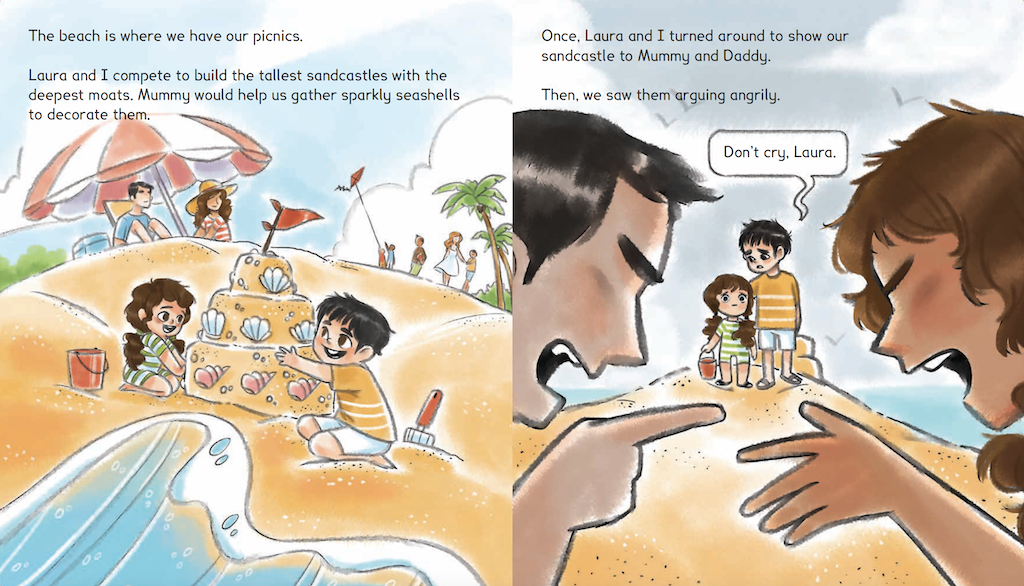SingaporeMotherhood | Parenting
May 2023
This made-in-Singapore book is helping Children of Divorce, one page at a time

When Kimberley Bruce was 18, her parents divorced. The experience impacted her deeply, but what was even more challenging was to see her eight-year-old brother grapple to comprehend the situation. “There were moments when the arguments between my parents got so heated that the police were called to step in. I had to shield my younger brother from the chaos and confusion. It was painful to see him struggle to understand what was happening. I did my best to reassure him that everything would be okay even though I was not sure of that,” says the co-author of I Know They Still Love Me, an illustrated storybook that tells the story of a Mason, a child of divorce and separation.
For Kimberley’s co-author Vanessa Danker, it was her experiences with children of divorce that led her to co-write this book. “As an early childhood educator, I’ve met many children who have shared stories about their parents going through a separation or divorce. It’s heart-wrenching to hear kids parrot words like “lawyers” or “new (sister/brother) but not the same house” or “I got a new (uncle/aunty) but not my (mother/father)” without understanding what they mean. When I ask them how they feel, they often struggle to find the words.
Children are incredibly perceptive and pick up on more than we often give them credit for. If they sense that something is wrong but do not have the words to express their feelings, it can be incredibly confusing and upsetting for them. By allowing them a safe space to share their feelings and talk with them about what’s happening and how they’re feeling, parents can help their children feel more secure and confident during difficult times.”
Their experiences – as a child of divorce, and as an educator of children who have gone through divorce – inspired Kimberley and Vanessa to write I Know They Still Love Me. Here, they share how the book helps children navigate the process, and understand that they are not alone.
Who do you want to reach out to with this book?
Our book is not just for families going through the process of divorce or separation but also for anyone who wants to gain a deeper understanding of the emotional impact it can have on children.
We also hope that relatives and friends of families going through divorce or separation can use the book to support and encourage their children to be understanding and supportive towards their cousins or friends.
At the heart of our message is the importance of empathy, communication, and support. Our book will inspire families to have open and honest conversations about their experiences, listen to each other with compassion, and work together towards healing and growth.
(See also: Do you have Parental Burnout?)
What message about divorce do you want to convey to readers?
Divorce or separation is challenging. Still, it is not the child’s fault. We want to emphasise that children are still loved. Our goal is to provide children with a safe and supportive environment where they can express their emotions and thoughts. Parents can communicate with their children in an appropriate way for their age, and children can be given the necessary information without feeling overwhelmed. We hope to provide comfort and reassurance to children during a difficult time.

What are some of the reactions you have had from young readers?
At the end of our book, an activity segment allows the parent and the child to explore how the child feels during the divorce process. It enables the child to voice out their emotions and the parent to infer from them, and help unpack the child’s emotions. It creates a starting point for them to understand their child’s point of view.
We have had parents telling us that this book and activity page aided their children, allowing them to speak freely. It validates their emotion while acknowledging the challenges of having two homes and separated parents. This allowed their child to express themselves freely.
Is divorce one of the toughest experiences for a child to go through?

Divorce is a significant life event that can change a child’s life significantly. These changes include alterations in living arrangements, routines, and relationships, which may lead to feelings of sadness, anger, and confusion. Children may also experience loss and grief when one parent is no longer living in the same home. They may metaphorically feel the loss of one of their parents.
Some individuals we talked to said that divorce is challenging for children, but other experiences, such as abuse or death, may be even more difficult for children to endure. Others shared that it can be messy but also a blessing – better a peaceful home with one parent versus a toxic one with both. Some even shared that divorce can be an early introduction to navigating relationships and loss.
How can parents help their children to navigate these life hurdles?
These tips, derived from both personal experiences and others’ expertise in counselling, can help parents support their children through challenging times:
1. Co-parent with the same rules

Co-parenting is very common in divorce. One major thing to ensure is that both parents have the same ground rules and discipline for the child. This provides the child with a set of values and a more stable environment. When both the parents are agreeable, the child knows what to expect.
2. Do not make the child the middle person
This adds mental stress to the child as he or she is relaying messages between both parents. It creates feelings of resentment among the parents and does not provide concrete decision-making for the child.
(See also: Depression in Children: Spot the Signs and Seek Help Now)
3. Recognise their strong observational abilities but acknowledge their limited understanding of the situation
One effective approach is to initiate a check-in with the child. Ask open-ended questions such as, “I wonder how you feel about mummy and daddy not being together?” This creates an opportunity for the child to express their emotions and provides a space for dialogue.
4. Develop a transition plan together

To facilitate their adjustment to the new environment, parents can collaborate with their child and develop a gradual transition plan. Using a step-by-step strategy, like the analogy of a staircase, can help the child visualise and navigate the changes more comfortably. For instance, asking, “I wonder what the first step would be for you to adjust to the new changes?” encourages the child’s participation in the process.
5. Empower them with choices
Divorce often brings about numerous changes, leading to feelings of helplessness in children. Empowering them with choices can be beneficial. Instead of overwhelming them with open-ended questions like, “What do you want to eat?” offer limited options to reduce their sense of being overwhelmed. For example, asking, “I wonder if you would prefer to eat cereal or toast for breakfast?” allows the child to make a decision within manageable parameters and feel a sense of control over their choices.
By implementing these strategies, parents can provide support, address the child’s emotions, and help them navigate the challenges associated with divorce or separation in a constructive and empowering manner.
What are the key messages that parents should put across to their children during these times?
- You are loved and valued.
- It’s okay to have difficult feelings and emotions.
- We are here for you and will support you.
- You are not alone.
- We will get through this together.
I Know You Still Love Me is available at the National Library, and is used by childcare centres and family support groups as a teaching aid. It can be bought at https://wrinkledpages.cococart.co/ (website) and @wrinkledpages.co (Instagram)
Featured image: NoName_13 from Pixabay
All content from this article, including images, cannot be reproduced without credits or written permission from SingaporeMotherhood.
Follow us on Facebook, Instagram, and Telegram for the latest article and promotion updates.





